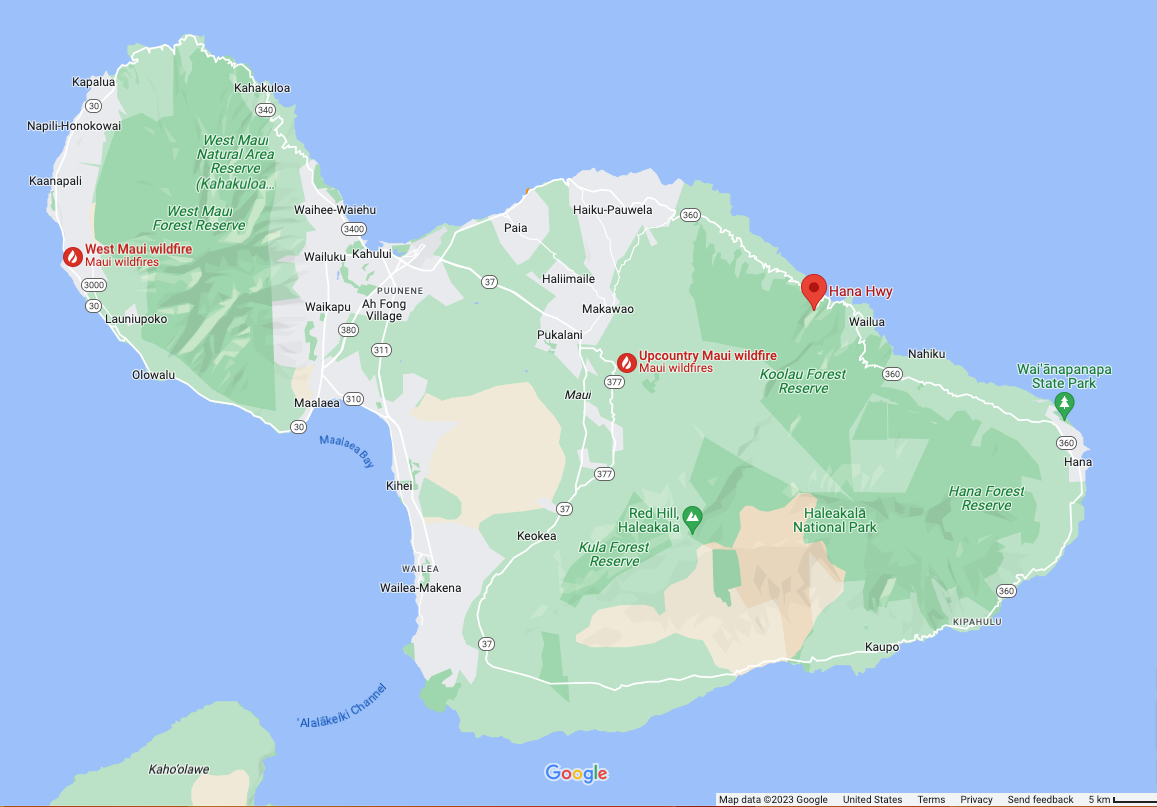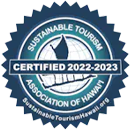
Was the Road to Hana Destroyed by Fires?
Was the Road to Hana Destroyed by Fires?
Despite recent wildfires in Maui, the Road to Hana remains untouched and open to travelers. The fires on the western side of the island did not impact this iconic route.
The Road to Hana: A Symbol of Maui’s Beauty
Hawaii’s Highway 360, more commonly known as the Hana Highway or simply “the Road to Hana,” is a testament to Maui’s natural splendor. This journey, winding through lush landscapes, cascading waterfalls, and tranquil beaches, has been a must-visit for countless travelers. The Hana Hwy 360, which runs along East Maui and encompasses Koolau Forest Reserve, Waiʻānapanapa State Park, Hana Forest Reserve, and Haleakalā National Park was untouched by the August 2023 fires.
Current Status: Untouched and Open
Amidst the devastation caused by the wildfires, many feared for the status of Maui’s cherished landmarks. Thankfully, transportation officials confirmed on Thursday that the fires did not reach the Hana Highway and The Road to Hana stands unscathed.
Understanding the Current Situation in Maui for Visitors:
In the wake of the Maui wildfires, there have been uncertainties surrounding the visitor experience on the island. We aim to shed light and offer a comprehensive perspective on the situation:
Safety First: The West side of Maui, the epicenter of the wildfire’s devastation, contains about 3/4 of the island’s visitor accommodations. Given that Maui was in the height of its tourist season, many accommodations were almost full. The swift evacuation was crucial to protect everyone, especially with the fires’ unpredictable spread.
Resource Allocation: The fires resulted in several road blockages, making it challenging for visitors to return to their accommodations. This led many to seek refuge and buy necessities from local outlets. Considering Hawaii’s reliance on imports for about 90% of its goods, it became essential to prioritize resources for the local community, especially with the dual pressure of catering to locals and visitors.
Prioritizing Local Needs: The fires have displaced a significant number of local families in West Maui. As a result, they are being given precedence for hotel accommodations. We request visitors to provide the Lahaina community with the necessary space and time for recovery. However, various parts of Maui are still welcoming visitors, including Kahului, Wailuku/Maalaea, Kihei/Wailea, Makawao/Pukalani, Kula, Paia, Haiku, and Hana.
Accommodation Focus: Due to the displacement of many local families in West Maui, they are being prioritized for hotel accommodations. We respectfully request visitors to give the Lahaina community the necessary time and space for recovery and rebuilding. Meanwhile, numerous regions in Maui are still welcoming visitors, such as:
- Kahului
- Wailuku/Maalaea
- Kihei/Wailea
- Makawao/Pukalani
- Kula
- Paia
- Haiku
- Hana
Balancing Act: Hawaii has always grappled with balancing local community needs and the tourism sector. The sentiment of “reconsider visiting” isn’t novel, but recent events have intensified this feeling. While we’re not deterring visits, we champion mindful and compassionate tourism.
Ideal Visitors: We appreciate visitors who come with a spirit of assistance and understanding. Think about dedicating a day for volunteering or consider “adopting” a local family to aid their specific requirements.
Empathy is Key: While Maui is a vacation hotspot, it’s crucial to acknowledge the island-wide sorrow and disruption. Every resident has felt the impact of the fires in some manner. We encourage visitors to practice patience and extend genuine aloha to our community.
Economic Implications: A potential downturn in tourism could severely impact our economy. A weakened tourism sector means many locals, already grappling with the aftermath of the fires, might face further economic hardships.
How You Can Help:
- Kokua (Help): Dedicate a day of your trip to volunteer. Assist in organizing and distributing supplies to those affected.
- Adopt a Family: Connect with a local family affected by the fires and assist with their specific needs.
- Support Local: Fill it up with products from local businesses before you leave. Instead of shopping at large chains, consider eating out at local restaurants, food trucks, and eateries.
- Monetary Donations: For monetary donations, we recommend the Hawaii Community Foundation‘s “Maui Strong” fund. This organization supports local families and helps keep Lahaina lands in Lahaina community hands.
- No Material Donations Please: At this time our community is NOT calling for physical/material donations such as clothing and household or personal care items. There is an overload of supply and lack of storage facilities, sorting and distribution capacity. At this time Maui is asking that no physical donations are brought to the Island by visitors. Maui officials do not want people to bring items to donate or to send donated items. There are too many donations, and not enough people to sort and organize clothing or other supplies. There is also nowhere to store the oversupply, and families cannot take on items until they are in permanent housing.
About Valley Isle Excursions
Valley Isle Excursions is a locally owned and operated Maui-based tour company focused on perpetuating Hawaiian culture and history while being Ambassadors of Aloha. We have been touring in style and comfort since 1997 and have a reputation as Maui’s leader in educational, vehicle-based tours. We are an eco-friendly company and a proud member of the Sustainable Tourism Association of Hawaii. Valley Isle Excursions is proud and grateful to be 1 of 4 commercial tour operators providing land tours into Haleakalā National Park (Summit District) through 2028.
Our Commitment
“To impart to our guests a genuine understanding of the aloha spirit and help them to travel pono by fostering care and respect for our community, environment and host culture.”








